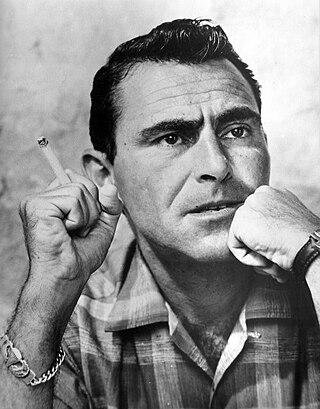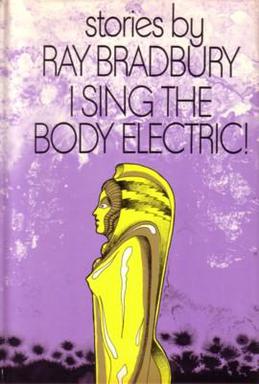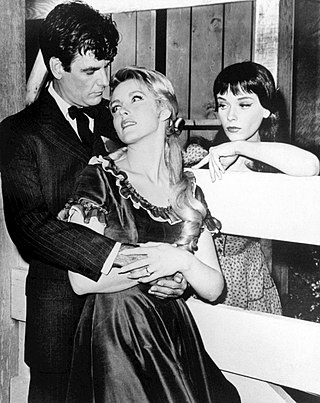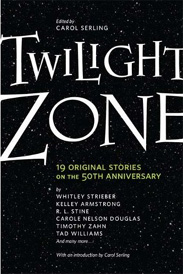Related Research Articles

The Twilight Zone is an American media franchise based on the anthology television series created by Rod Serling in which characters find themselves dealing with often disturbing or unusual events, an experience described as entering "the Twilight Zone". The episodes are in various genres, including fantasy, science fiction, absurdism, dystopian fiction, suspense, horror, supernatural drama, black comedy, and psychological thriller, frequently concluding with a macabre or unexpected twist, and usually with a moral. A popular and critical success, it introduced many Americans to common science fiction and fantasy tropes. The first series, shot entirely in black-and-white, ran on CBS for five seasons from 1959 to 1964.

Rodman Edward Serling was an American screenwriter and television producer best known for his live television dramas of the 1950s and his anthology television series The Twilight Zone. Serling was active in politics, both on and off the screen, and helped form television industry standards. He was known as the "angry young man" of Hollywood, clashing with television executives and sponsors over a wide range of issues, including censorship, racism, and war.
"I Shot an Arrow into the Air" is the fifteenth episode of the American television anthology series The Twilight Zone.
"Long Live Walter Jameson" is episode 24 of the American television anthology series The Twilight Zone.

"The After Hours" is episode thirty-four of the American television anthology series, The Twilight Zone. It originally aired on June 10, 1960, on CBS.
"A World of His Own" is episode thirty-six of the American television anthology series The Twilight Zone. It was the last episode of the show's first season and essentially comedic in tone. It originally aired on July 1, 1960, on CBS.
"The Invaders" is episode 15 of season 2 of the American television anthology series The Twilight Zone. The episode, which originally aired January 27, 1961, starred Agnes Moorehead. It was written by Richard Matheson, directed by Douglas Heyes, and scored by Jerry Goldsmith. Distinctive features of this episode include a near-solo performance by one character, and an almost complete lack of dialogue. The only dialogue in the entire episode aside from Rod Serling's usual narration came from Douglas Hayes, the episode's director. In addition, this is the only episode in which Rod Serling gives his opening monologue at the start of the prologue, rather than the end. The protagonist portrayed by Agnes Moorehead often cries out in pain and terror, but never speaks.
"The Night of the Meek" is episode 47 of the American television anthology series The Twilight Zone. It originally aired on December 23, 1960, on CBS. It was one of the six episodes of the second season which were shot on videotape in a short-lived experiment aimed to cut costs.

"Long Distance Call" is episode 58 of the American television anthology series The Twilight Zone. It originally aired on March 31, 1961, on CBS. In the episode, a 5-year-old boy named Billy communicates with his dead grandmother using a toy telephone that she gave him on his birthday. It was one of the six episodes of the second season which was shot on videotape in a short-lived experiment aimed to cut costs.
"It's a Good Life" is the eighth episode of the third season of the American television series The Twilight Zone, and the 73rd overall. It was written by series creator/showrunner Rod Serling, based on the 1953 short story "It's a Good Life" by Jerome Bixby. The episode was directed by James Sheldon, and is considered by some, such as Time and TV Guide, to be one of the best episodes of the series. It originally aired on November 3, 1961. The episode was one of four from the original 1959 series which formed the basis of the 1983 film Twilight Zone: The Movie.
"The Bewitchin' Pool" is the 156th and last episode of the first incarnation of the American anthology television series The Twilight Zone. It originally aired on June 19, 1964 on CBS.
An Occurrence at Owl Creek Bridge is a 1961 French short film, almost without dialogue. It was based on the 1890 American short story of the same name by American Civil War soldier, wit, and writer Ambrose Bierce. It was directed by Robert Enrico and produced by Marcel Ichac and Paul de Roubaix with music by Henri Lanoë. It won awards at the Cannes Film Festival and the Academy Awards. The film was later screened on American television as episode 22 of the fifth season of The Twilight Zone on 28 February 1964.

The Twilight Zone is an anthology television series which aired from September 27, 1985, to April 15, 1989. It is the first of three revivals of Rod Serling's acclaimed 1959–64 television series, and like the original it featured a variety of speculative fiction, commonly containing characters from a seemingly normal world stumbling into paranormal circumstances. Unlike the original, however, most episodes contained multiple self-contained stories instead of just one. The voice-over narrations were still present, but were not a regular feature as they were in the original series; some episodes had only an opening narration, some had only a closing narration, and some had no narration at all. The multi-segment format liberated the series from the usual time constraints of episodic television, allowing stories ranging in length from 8-minutes to 40-minute mini-movies. The series ran for two seasons on CBS before producing a final season for syndication.

I Sing the Body Electric! is a 1969 collection of short stories by Ray Bradbury. The book takes its name from an included short story of the same title, which in turn took the title from a poem by Walt Whitman published in his collection Leaves of Grass.

The Twilight Zone is an American fantasy science fiction horror anthology television series created and presented by Rod Serling, which ran for five seasons on CBS from October 2, 1959, to June 19, 1964. Each episode presents a standalone story in which characters find themselves dealing with often disturbing or unusual events, an experience described as entering "the Twilight Zone", often with a surprise ending and a moral. Although often considered predominantly science-fiction, the show's paranormal and Kafkaesque events leaned the show much closer to fantasy and horror. The phrase "twilight zone", inspired by the series, is used to describe surreal experiences.

"The Fugitive" is episode 90 of the American television anthology series The Twilight Zone.

"Jess-Belle" is an episode of the American television science fiction and fantasy anthology series The Twilight Zone. In this episode, a young woman, whose name sounds like "Jezebel", spurned by the man she loves, becomes a witch in order to make him love her.
"Come Wander with Me" is the final episode to be filmed of the American television series The Twilight Zone. This episode introduced Bonnie Beecher in her television debut.
The Electric Grandmother is a television movie that originally aired January 17, 1982, on NBC as a 60-minute Project Peacock special, based on the 1969 science fiction short story "I Sing the Body Electric" by Ray Bradbury. It stars Maureen Stapleton and Edward Herrmann and was directed by Noel Black. Bradbury's story was originally written as a teleplay in 1962 as "I Sing the Body Electric", an episode of The Twilight Zone. The film was distributed on VHS by Coronet Video.

Twilight Zone: 19 Original Stories on the 50th Anniversary is an anthology of short stories written by various authors and edited by Carol Serling, the widow of series creator Rod Serling. Each story was written with themes or styles similar to The Twilight Zone episodes, including a narrated introduction and conclusion. Authors who contributed stories include Twilight Zone veterans Earl Hamner Jr., Alan Brennert, William F. Wu, and Rod Serling. Reviewers listed some of the better stories as being Kelley Armstrong's "A Haunted House of Her Own", Alan Brennert's "Puowaina" and Mike Resnick and Lezli Robyn's "Benchwarmer".
References
Footnotes
- ↑ "Short Stories Cross-Reference". Home.wlv.ac.uk. Archived from the original on February 2, 2013. Retrieved May 21, 2013.
- ↑ Whitman, Walt. "I Sing the Body Electric". Poetry Foundation. Retrieved September 26, 2020.
- ↑ Conlon, Christopher (June 15, 2011). "The Man Fathers of Martin Sloan". Rod Serling Memorial Foundation. Retrieved September 26, 2020.
- ↑ "Electric Grandmother (1981)". AllMovie. Retrieved September 26, 2020.
Bibliography
- DeVoe, Bill. (2008). Trivia from The Twilight Zone. Albany, GA: Bear Manor Media. ISBN 978-1-59393-136-0
- Grams, Martin. (2008). The Twilight Zone: Unlocking the Door to a Television Classic. Churchville, MD: OTR Publishing. ISBN 978-0-9703310-9-0